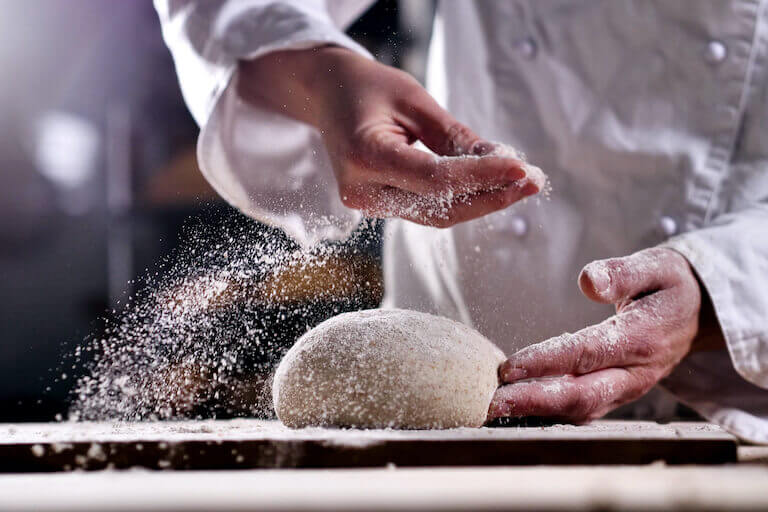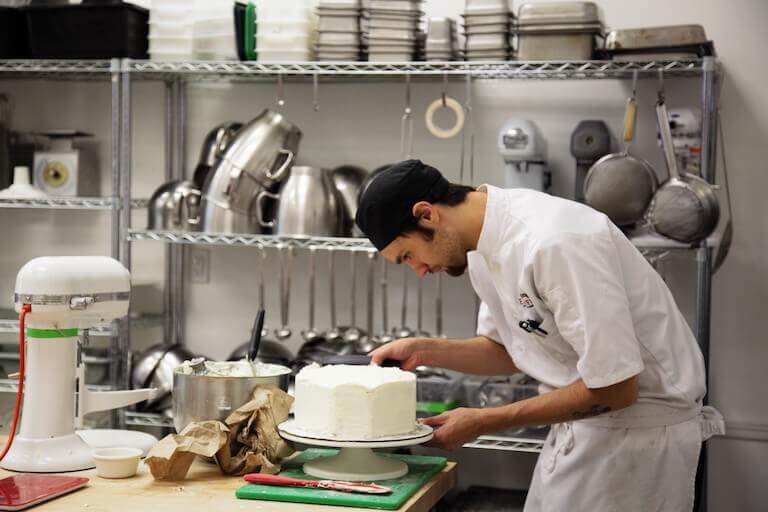Listen to This Article:
Maybe you’ve always been the go-to person who friends and family tap to make a special cake or dessert for birthdays and celebrations, and you’re considering doing it professionally. Or you might be interested in the role of the businessperson who supplies local delis and restaurants with their grinder rolls and breads.
In either situation, you’d look to open a bakery. But where to begin? If you’re wondering how to open a bakery, following these steps can give you a good start.
1. Determine Your Product Niche
If you’re thinking of opening a bakery, you’ll want to make sure your product stands out. Take time to do some market research to figure out the product line that utilizes your strengths and skills—as well as being one you enjoy—and that you know will fill a customer need.
Do you want to focus on wedding cakes or cookies? Doughnuts or savory pastries? Will you cater to a kosher market or perhaps go gluten-free? One of the best ways to determine your specialty is by assessing what you most enjoyed during your training or education at a baking and pastry school.
Your experience in culinary school might help you get laser-focused on your niche and your brand. It can give you the leg-up you may need over the competition when opening a bakery.

Your hobby in baking might be turned into a career with the right planning.
2. Write a Business Plan
You’re going to need a roadmap to follow when starting a business. A business plan can help you clarify your goals and the steps you need to take to get there. Then, as you move through the process, you can refer to that plan regularly to gauge whether you’re on track and whether you need to tweak anything along the way.
A solid business plan includes a market analysis; a description of your establishment’s service style; a sample menu with pricing; building design and location; staff needs; a projection of revenue and expenses; and a marketing plan.
You might be excited to jump into baking and decorating, but make sure you spend time on these kinds of details up-front. Honest analysis and attention to minutiae at the start might just help you avoid stress and heartache later.
3. Consider Location, Location, Location
Your business location matters just as much as the product you sell. As you consider your demographic and write your business plan, research the type of location that would work best.
Where do your ideal customers live and shop? Is it easy for them to find you and get to you? How much does foot traffic matter? Is the area safe, and how much competition is nearby?
How much parking should be available? If people will be picking up trays of cookies or specialty cakes, for example, they’ll need to be able to park nearby. If you plan to bake bread for area sandwich shops, you’ll need space for delivery trucks to come and go.
As you analyze ideal locations, be optimistic…and also realistic. Think about your plan for growth and whether you desire to stay small and mighty or expand into multiple locations. If you do want to expand, consider how you might acquire more resources to support this expansion, such as more ovens, bigger refrigeration units, and a larger staff.
Additional Location Factors to Consider:
- Is it going to be a commercial kitchen or a retail space?
- Will you need a public bathroom?
- If you plan for growth, where would you move to if you needed more space?
- Where would you open a second location if you decide to franchise?
4. Raise the Dough
Securing a lease can take time and possibly involve paying a consultant to make sure you cover the legalities and liabilities properly. Sourcing your equipment, ingredients, staff… all these things can take both time and some financial investment before you’ve even turned on the oven.
Like any other start-up, launching a bakery won’t be cheap. The process of securing the capital you need to start your business can be extensive, so it’s a good idea to get started as early in the process as possible.
Common Ways to Secure Capital
Most business owners use a combination of funding. You’re probably going to need a bank loan, so do your research to figure out what criteria is needed and what you’ll need to do to be able to qualify.
Many entrepreneurs work with investors, which can range from pitching your concept to investors with lots of capital directly to crowdfunding and receiving many small donations. Technology is expanding your options for raising money, but regardless of your route, you’ll always need a good business plan and a solid pitch.
Additionally, check out your local Chamber of Commerce or small business association. There are sometimes start-up grants or tax incentives for new businesses. These organizations can also prove helpful in connecting you with local businesses that may look to partner with your new bakery or even local investors who want to support businesses within the community.
**Note: Auguste Escoffier School of Culinary Arts does not provide financial advice. Always consult with a professional to determine what is best for your situation.

It’s important to improve your skills at making dough as well as raising it when opening a bakery.
5. Get Your Licenses and Permits
Check in early and often with your city planning department and ask questions; ditto for checking on state licensure and registration requirements. Any food service establishment will need special permits and licenses, and typically you’ll need to get an inspection from the Health Department.
The list can get lengthy, but to begin with, they typically include things like a business license; a food and beverage license; zoning permits, depending on any changes to the building or property you might make, as well as how you might operate there; a Certificate of Occupancy (CO) that demonstrates everything’s up to code and you’ve been approved to open; a sales permit to charge sales tax; and labor registration if you plan to hire employees.
You might find it helpful to work with a checklist, and some of these regulators might already have some you can refer to. In fact, the laundry list of requirements they have may help you decide on your location. If the requirements are lengthy, finding a space with a pre-existing, fully equipped kitchen may save you money in the long run, instead of having to outfit one from scratch.
There will also likely be local rules that aren’t necessarily state-wide—and some of them might surprise you. However, it’s important to remember that local regulators are there to help you succeed;check in with them to make sure your business space will be up to snuff.
6. Equip Your Facility
Baking often requires specialized equipment. You may need to consider your baking specialty—are you making cakes, cookies, or croissants? You’ll also need to consider the size of your facility. Can your space hold industrial-sized fridges, freezers, mixers, and ovens, as well as cooling racks and display cases? Find out what you may need, what you can fit, and where to obtain this equipment. To stay within budget, many budding bakery owners might scour the internet for secondhand equipment that’s still in relatively good condition.
Also, do your research to find where you can save on wholesale ingredients. Running a bakery means baking in large quantities, so you’ll want to be savvy with your ingredient purchases and stock up on any deals you can find. Large-scale food providers may also offer assistance with food costing and menu planning/design.

It’s important to understand the type of equipment and space you’ll need in your bakery.
7. Build Your Team
Finally, you may need to hire employees to help you run your shop. This task in itself can require a lot of time, consistent job marketing, interviewing, and follow-up communication, and typically some trial and error.
You may need some help in the kitchen, duties that can include dough makers, cake decorators, and bakery assistants. And then there’s the front of house responsibilities; if you’re busy baking, you may need people to man the cash register, take orders, and serve customers. A dishwasher might also help free you up to focus on baking and entrepreneurial tasks. And once you grow enough, you might need a manager to help coordinate.
One key is to start small, ensuring that you can support the salaries of anyone you hire. The last thing you want to do is overestimate the revenue you’ll be bringing in and end up having to let go of the people you just hired.
In fact, many bakery founders exclusively do the work themselves until they reach a comfortable level of profitability. But even hiring one or two people to join your team can save you exhaustion and potential burnout, and help you keep the shop open for more extended hours (potentially meaning more money in your pocket).

Building your own team is an essential step to opening a bakery.
Take the Next Step to Open a Bakery
Opening your own bakery is no small feat. Each of these steps requires grit and determination. But beyond that, having foundations of knowledge in writing business plans, networking, and of course, baking itself, can significantly impact the success of your future operation.
Escoffier’s degree and diploma programs in the baking and pastry arts or food entrepreneurship can help you further explore how to open a bakery and potentially turn your dream into a reality.
IF YOU WANT TO KNOW MORE ABOUT A CAREER IN BAKING AND PASTRY ARTS, CHECK OUT THESE ARTICLES NEXT:
- 6 Advanced Baking Techniques Every Pastry Chef Should Know
- Sanitation Best Practices in Bakeries
- How to Start a Bakery Business from Home
This article was originally published on February 24, 2016, and has since been updated.
*Information may not reflect every student’s experience. Results and outcomes may be based on several factors, such as geographical region or previous experience.



